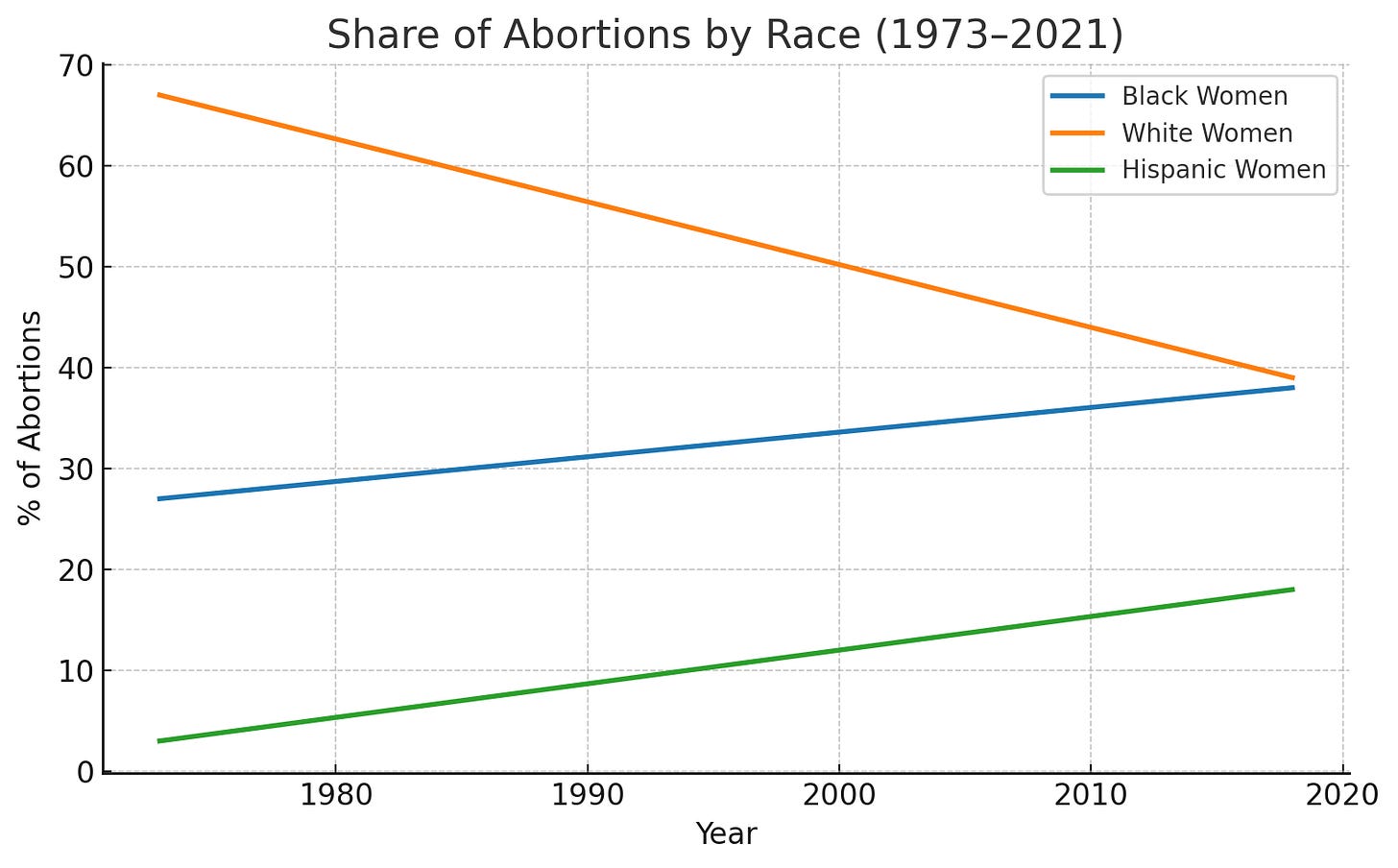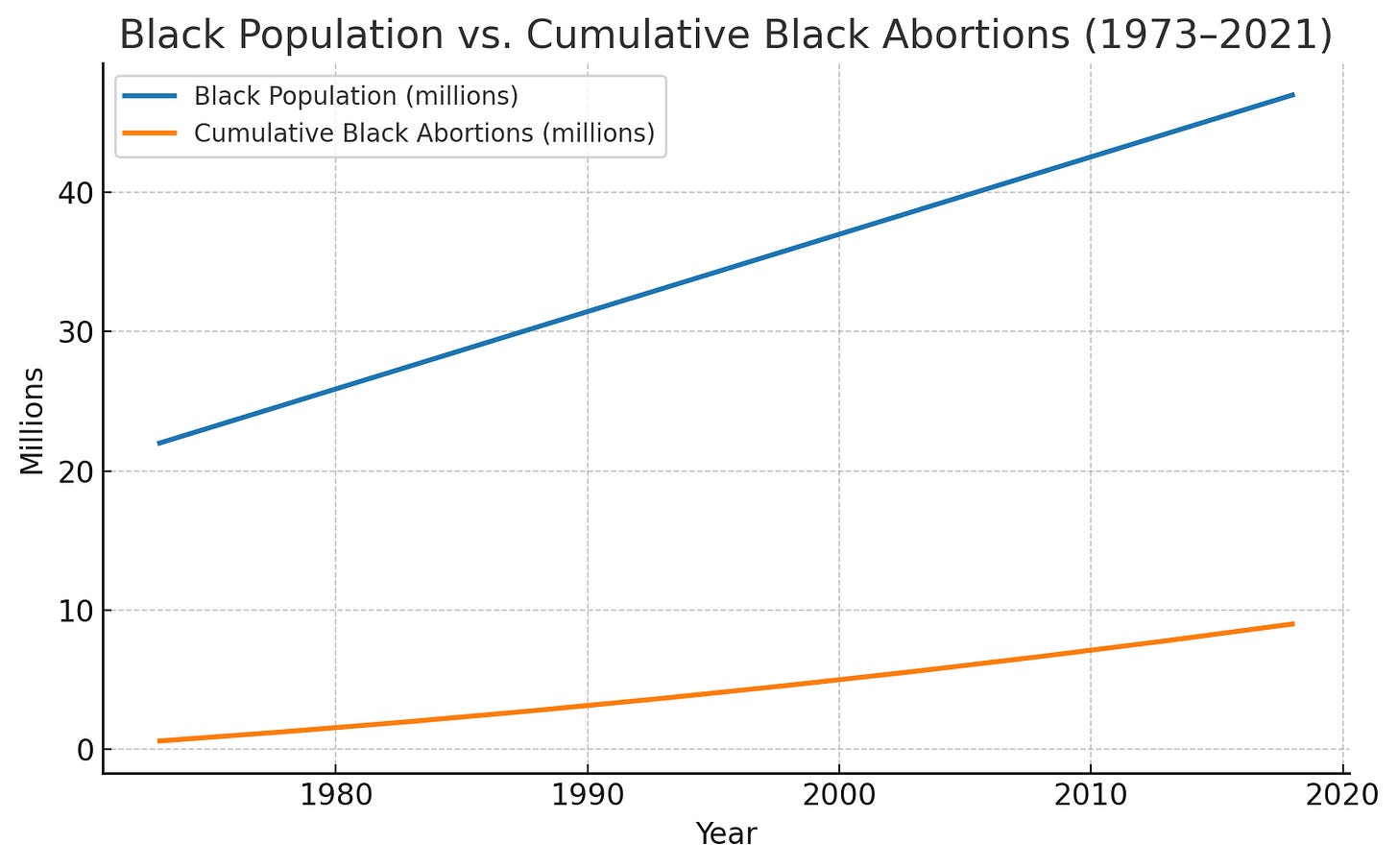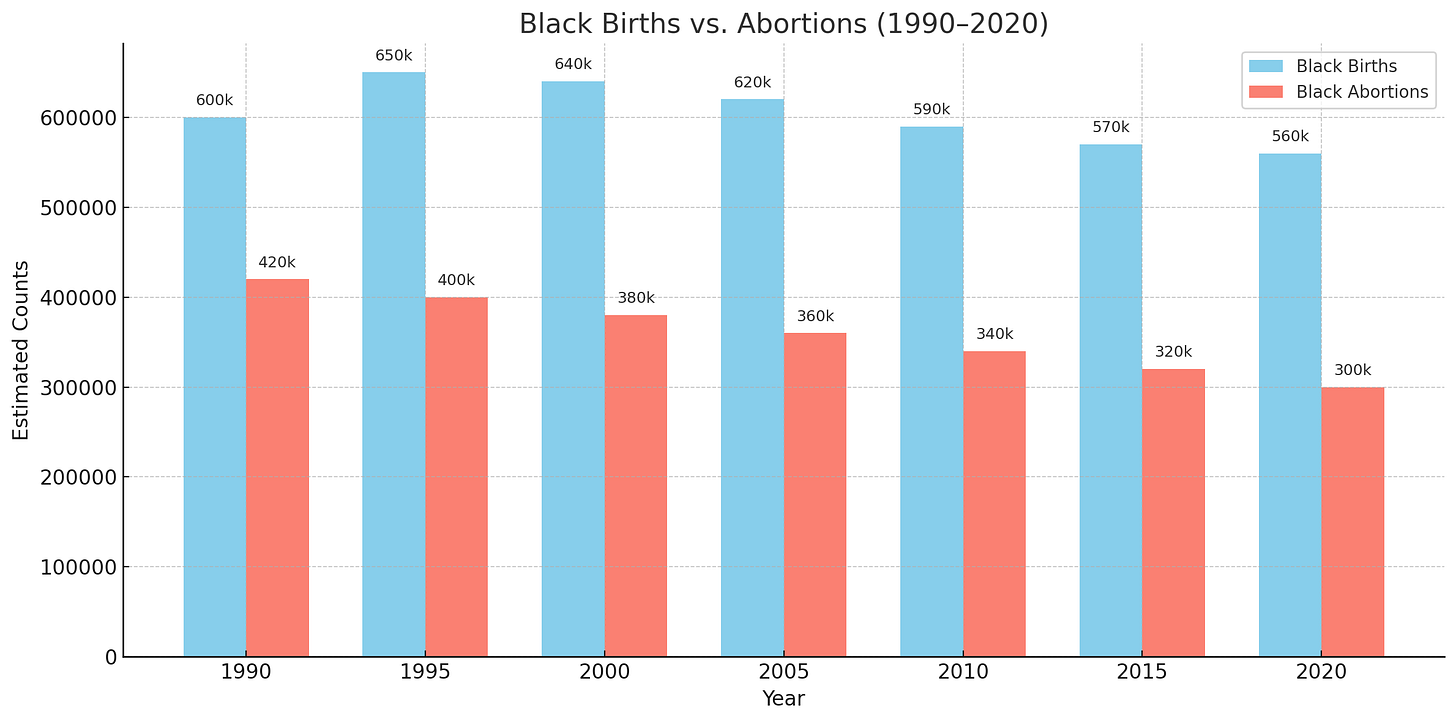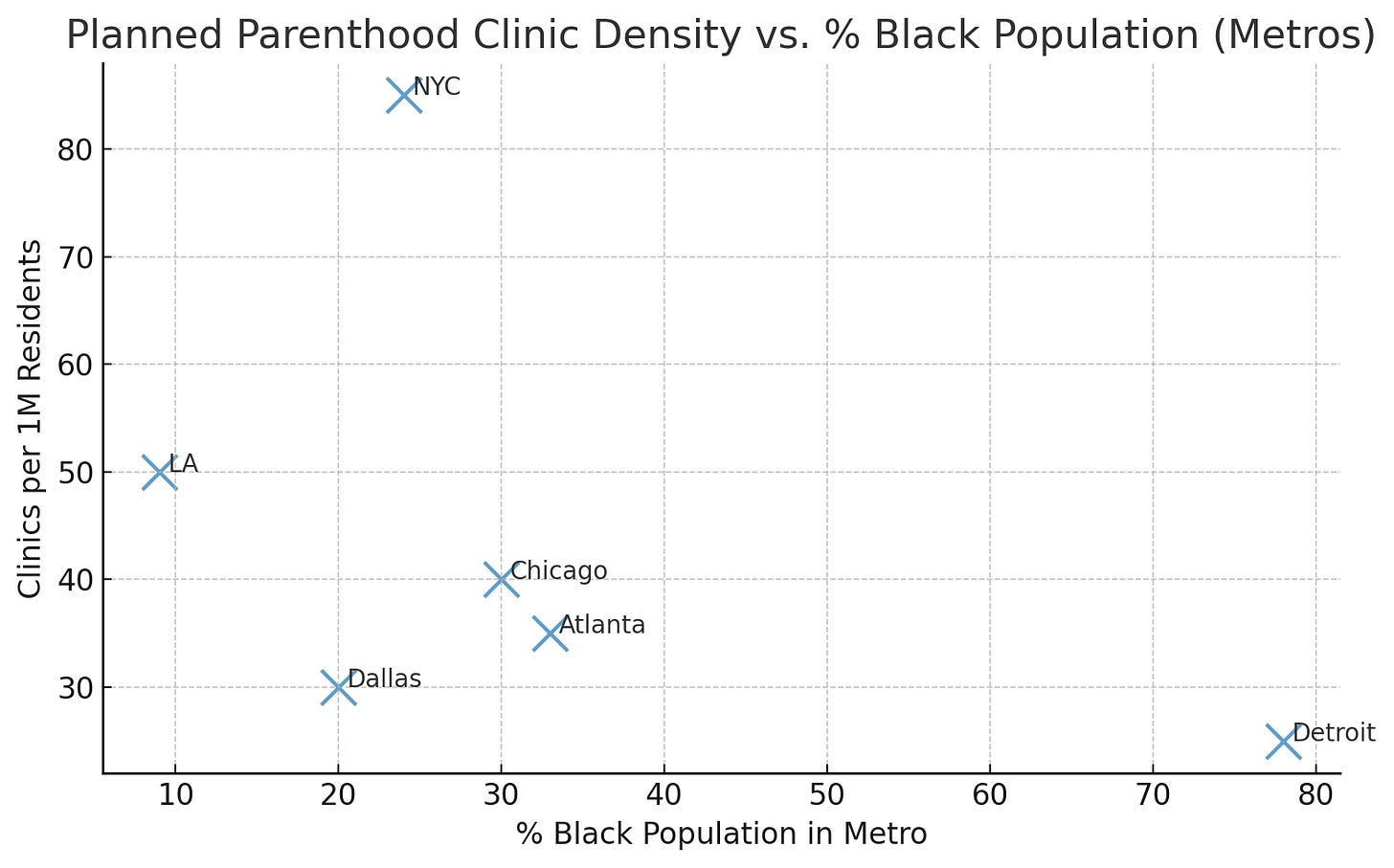The First Act of Black-on-Black Violence Is in the Womb
How Many Black Lives Never Got to Matter?
The Hidden Stat No One Applauds
These days, we hear a lot about Black excellence. Black women are leading the way in college enrollment, small business ownership, and political organizing. Every magazine cover seems to celebrate another barrier being broken. And many of those stories are real.
But there’s one area where Black women lead the nation, year after year, and no one wants to talk about it.
Abortion.
Black women make up just 6.8% of the U.S. population. Yet they account for nearly 40% of all abortions. In cities like New York, more Black children are aborted than born. That is not empowerment. That is elimination.
We live in a culture that cheers when Black women are “killing it” in business or academia. But there’s a darker truth buried under the applause: “Black Women Are Killing It but Unfortunately, We Mean Babies.”
That’s not a joke. It’s a tragedy disguised by silence.
And nobody’s clapping.
The Numbers Don’t Lie
Let’s put emotion aside and look at the data.
In the United States, Black women make up 6.8% of the population. Yet for decades, they’ve accounted for a vastly disproportionate share of all abortions.
According to the CDC’s 2021 Abortion Surveillance Report, non-Hispanic Black women accounted for 28.6% of all reported abortions across participating areas. Other research, including studies by the Guttmacher Institute, a pro-abortion research group that was originally part of Planned Parenthood, and the Kaiser Family Foundation, a nonprofit focused on health policy, puts that figure even higher. Their estimates often range from 29% to 40%, depending on how the data is collected and whether states like California and New York are included, since those states do not report race-specific abortion data to the CDC.

In raw terms:
The CDC recorded 625,978 abortions in 2021 from reporting jurisdictions.
At 28.6%, that translates to approximately 179,000 abortions among Black women in that year alone.
Now compare that to Black mortality from all causes.
Public-facing CDC datasets do not publish one final number labeled “non-Hispanic Black deaths” in total, but multiple tables and WONDER queries suggest the all-cause death count for non-Hispanic Black Americans in 2021 was approximately 348,000.
At first glance, that would suggest more deaths than abortions. But that total includes COVID-19 fatalities, which spiked disproportionately in 2020 and 2021.
If you remove COVID-related deaths, roughly 70,000 in 2021 for Black Americans, the remaining non-COVID Black deaths total about 278,000.
That means the number of Black abortions was around 64% of the total non-COVID death count in a single year, among a group that comprises less than one-tenth of the U.S. population.
And that’s using conservative numbers.
If you include estimates from Guttmacher or account for non-reporting states like California and New York, states with large Black populations, the true abortion count may be significantly higher.
In some years past, the number of abortions among Black women actually exceeded all Black deaths from all causes. That appears to have happened between 2006 and 2010, and possibly in 2012 to 2014, depending on the dataset.
So what does this tell us?
It tells us that abortion among Black Americans has not just been common but, at times, more frequent than death itself.
And yet, how often do we hear about it?
We watched mass behavioral change happen overnight during the COVID pandemic. People masked up, stayed home, shut down businesses, closed schools, and avoided family gatherings; all because we were told that lives were at stake.
But if that level of urgency were applied to the protection of unborn Black lives, how many would be saved?
Where’s the mobilization?
Where’s the outrage?
Where’s the slogan?
Instead, we get silence, not just from media and political leaders, but from many inside the community itself. And when someone does speak up, they’re quickly told to be quiet. That this is a “personal decision.” That it’s “healthcare.”
But 179,000 isn’t personal. It’s systemic. It’s statistical. It’s historic.

We can debate the causes. We can analyze the incentives. But what we cannot do is deny the numbers.
Because the numbers don’t lie.
They never have.
The Silence Is Not Accidental
When a Black man dies at the hands of a white police officer, it’s on the front page. Every major network runs the footage. Corporations release statements. Sports teams cancel games. Streets are renamed. Murals go up. Presidential candidates take a knee in kente cloth.
But when nearly 180,000 unborn Black children are aborted in a single year, there’s no press conference. No protest. No pledge to "say their names."
That silence is not a coincidence. It’s engineered.
Start with the locations.
More than 70% of Planned Parenthood clinics are in or near Black communities. In cities like New York, Philadelphia, Chicago, and Washington DC, abortion clinics are often concentrated within walking distance of predominantly Black neighborhoods.
In 2012, the New York City Department of Health reported that more Black babies were aborted than born. The trend persisted for several years. In 2016, 1,180 more Black children were aborted in New York City than were delivered alive. That’s not a statistic. That’s a demographic shift.

Now look at the funding.
Planned Parenthood receives over $600 million per year in taxpayer funding, and its political arms donate millions to Democratic candidates, the same politicians who oppose even modest restrictions on abortion. In 2020, Planned Parenthood’s political action committee spent over $45 million to support Democrats.
That money buys silence. It buys loyalty. And it buys policies.
Democratic leaders now support abortion up to the point of birth in some cases. They fight laws requiring parental notification. They oppose safety regulations for clinics. They attempt to shut down crisis pregnancy centers that offer alternatives.
When Roe v. Wade was overturned, corporate America jumped in to offer travel reimbursements for abortion, not for adoption services, not for child care, not for prenatal health. Just abortion. Because it’s cheaper to fund a procedure than to accommodate a mother.
And in the activist space, the silence is even more deafening.
Black Lives Matter, the organization, has never marched for unborn Black lives. It has never condemned the abortion industry. In fact, its original charter explicitly promoted abortion access as a core value.
We are told that bodily autonomy is sacred. That this is about choice. But if abortion is truly a “choice,” why is it the only one promoted?
Where are the campaigns to celebrate motherhood in Black America?
Where are the scholarships for women who keep their babies?
Where is the cultural pride in protecting Black children before they’re born?
Instead, what we see is a full-court press to normalize abortion, subsidize it, and shield it from scrutiny, even as the numbers grow.
That’s not freedom. That’s pressure.
That’s not empowerment. That’s policy.
And that’s not silence. That’s design.
Because if people really saw the scale of what’s happening, if they saw a community ending hundreds of thousands of its own lives each year, aided by taxpayer money and political cover, they might start asking the one question no one wants to hear:
Why?
And that’s a question the system can’t afford to answer.
Who Benefits?
When something persists for decades despite devastating consequences, you can be sure someone is profiting from it. Abortion in Black America is no different.
Start with the industry itself. Planned Parenthood and other providers are not charities. They are businesses. They depend on a steady stream of clients, and those clients disproportionately come from poor and minority neighborhoods. The placement of clinics is no accident. The more abortions performed, the more revenue generated. A practice that wipes out hundreds of thousands of unborn Black children each year is also keeping the lights on and the payrolls met.
Then consider politics. Every aborted child is a life that will never vote. That silence favors the status quo. For decades, the Democratic Party has wrapped itself in the language of civil rights while quietly supporting policies that ensure millions of Black voices never exist to demand real accountability. At the same time, those who do survive are told they are victims, dependent on the very politicians who profit from their dependency. A smaller, more politically manageable Black population makes it easier to maintain control while keeping the rhetoric of justice alive.
There is also the non-profit sector. Foundations, advocacy groups, and international organizations all pump money into “reproductive health” initiatives. These programs are dressed up as empowerment, but the measurable result is not stronger Black communities. It is fewer Black children. The flow of grants and contracts continues because the donors and activists benefit from signaling virtue while reinforcing the same cycle of decline.
Even corporate America plays a role. Companies that offer to pay for abortions but not for child-rearing benefits are not promoting freedom. They are protecting their bottom line. An employee who aborts is cheaper to the company than an employee who takes maternity leave. In this sense, abortion is not a right but a cost-saving strategy disguised as compassion.
So when we ask, “Who benefits?”, the answer is clear. The abortion industry benefits. Politicians benefit. Advocacy groups benefit. Corporations benefit.
The only ones who do not benefit are the children who never see life, and the communities that are left permanently diminished.
The Roots Were Rotten from the Start
If today’s numbers seem alarming, the history behind them is even more disturbing.
Planned Parenthood did not begin as a movement to uplift women. It started as a tool of population control, aimed squarely at those deemed undesirable. Its founder, Margaret Sanger, was not simply a nurse or an advocate for reproductive rights. She was a committed eugenicist who believed that some lives were more valuable than others.
Sanger promoted what she called “race betterment” and openly supported sterilizing those she labeled unfit. She believed the poor, the mentally ill, and racial minorities were dragging society down. Her language was not vague or misquoted. It was deliberate.
In a 1939 letter to Dr. Clarence Gamble, Sanger wrote:
“We do not want word to go out that we want to exterminate the Negro population.”
Some defenders argue this quote was taken out of context. But context does not change her intent. She launched the Negro Project, a campaign to bring birth control and sterilization to Black communities. To make it palatable, she enlisted Black pastors and leaders to spread the message. The goal was not empowerment. It was control.
She also spoke at Ku Klux Klan meetings and published in journals aligned with racial “hygiene.” Her allies in the eugenics movement would go on to inspire policies in Nazi Germany. These are not conspiracy theories. They are historical facts, documented in her own writings and speeches.
Today, Planned Parenthood tries to distance itself from Sanger’s legacy. A few buildings have removed her name. Some websites have rewritten the language. But the strategy remains the same.
Most of Planned Parenthood’s clinics are still located in or near minority neighborhoods. Black women still account for a disproportionate number of abortions. The marketing may be softer, but the impact is just as sharp.

If any other organization had this kind of racial history, it would be dismantled. There would be no debate. Politicians would fall over themselves to condemn it. Yet Planned Parenthood receives over $600 million in taxpayer funding each year, and it remains politically untouchable.
The reason is simple. It delivers something valuable to those in power. It reduces birth rates in the most politically inconvenient populations. It turns a social problem into a private one. And it keeps the conversation focused on choice, not consequences.
But history does not disappear just because it is uncomfortable.
And silence does not erase intent.
This was never about freedom.
It was about control.
It still is.
The Culture Was Conditioned
A crisis on this scale does not happen by accident. It takes time, repetition, and strategy. It takes policies that reward certain behaviors and punish others. And it takes a culture that has been carefully conditioned to see the unnatural as normal.
Abortion in Black America did not become widespread overnight. It became accepted because it was made to feel inevitable.
Start with economics. If a young Black woman is struggling to make ends meet, she is told that abortion is the responsible choice. If she keeps the baby, she faces pressure, judgment, and often no support. But if she aborts, she is praised for being practical. She is told it was brave. Empowering. Necessary.
Then there is education. Public schools in many urban areas provide sex education that promotes contraception and abortion access, but rarely offer serious alternatives like adoption or community support for parenting. Some schools even refer students directly to abortion providers without involving parents.
Entertainment reinforces the message. From TV dramas to music videos, the idea is planted early. A pregnancy is shown as a setback. A burden. Something to be eliminated before life can move forward. Very rarely is a child portrayed as a gift. And almost never is the value of life in the womb explored at all.
Meanwhile, fatherhood has been quietly removed from the conversation. In many communities, the idea of a two-parent home is treated like a fantasy. Abortion becomes the final form of male disengagement. A man can pressure a woman to end the pregnancy and walk away without consequences. The burden is hers alone.
The political system makes it worse. Many Black voters continue to support candidates who fight any restriction on abortion. These same politicians claim to speak for the Black community while funding an industry that targets it for destruction. They promote policies that subsidize single parenthood, incentivize dependency, and reinforce the lie that abortion is a form of freedom.
It is not freedom when the only option you are given is the one that ends a life.
It is not empowerment when the system discourages you from choosing anything else.
And it is not equality when one group is pushed toward extinction while the rest of the country looks away.
What we are witnessing is not just a medical issue. It is cultural engineering.
A people who once celebrated large families, community roots, and generational legacy have been taught to see children as liabilities. They have been told that their future lies in education, career, and independence, but never in building strong families, never in protecting the next generation.
This is not accidental. It is by design.
And until we confront that design, the numbers will only continue to rise. The slogans will keep changing. The silence will remain. But the loss will grow.
What Do We Truly Value?
If a nation can be judged by what it protects, then we already know where we stand.
We protect animals.
We protect endangered species.
We protect historic buildings, foreign borders, and foreign cultures.
But we do not protect unborn Black children.
This is not due to lack of knowledge. The data is public. The history is documented. The impact is visible. Entire communities have been hollowed out, generation after generation, while the political class celebrates "access" and applauds the "right to choose", even when that choice results in death, not life.
It raises the question no one wants to answer.
What exactly do we think Black lives are for?
Are they political tools? Are they background for speeches? Are they talking points to justify more government spending?
Because they are not being treated like lives worth preserving.
When Black men die at the hands of police, the country erupts. And sometimes, the outrage is justified. But when hundreds of thousands of Black children are extinguished before they take their first breath, there is no protest. No murals. No marches. No hashtags.
The same politicians who claim to care about equity have nothing to say. The same celebrities who speak out about oppression go quiet. The same activists who chant about Black futures ignore the fact that millions of Black futures were never allowed to begin.
And why?
Because the unborn cannot vote. They cannot organize. They do not serve the political machine. They cannot be exploited.
They are inconvenient.
So they are erased.
But that choice, to erase life in the womb, is not neutral. It shapes who we are. It tells the next generation what matters. It says loud and clear that survival is optional and motherhood is negotiable.
That is not a community on the rise. That is a community being managed.
Until Black America decides that its unborn matter more than its messaging, nothing will change. No policy will save what a conscience no longer values. No funding will heal what culture has already discarded.
It begins not with outrage, but with honesty.
Because if we do not tell the truth about what is happening, someone else will continue to lie. And they will keep profiting from the silence.
The numbers will continue. The clinics will stay open. The slogans will remain polished.
And the graves will keep filling.
Arnell’s Substack is a reader-supported publication. I don’t run ads. I don’t hide my work behind paywalls. Everything I write is for everyone, especially the people no one else will speak for.
If you value this work, you can help keep it going:
Become a Paid Subscriber: https://mrchr.is/help
Join The Resistance Core (Founding Member): https://mrchr.is/resist
Buy Me a Coffee: https://mrchr.is/give
Sharing and restacking also help more than you know.



This is the second Arnell piece I have read, and it is again magnificent. I have never read as convincing an author before with the possible exception of Angelo Codevilla. I found the two pieces I have read so far un-putdownable. I had to read them to the end without a break. I only wish that he had been writing back in the days when I was teaching and could have distributed his works to my colleagues who desperately needed to hear these things. I have always felt uncomfortable about abortions. I never realized how directed and aimed they were towards a particular community. The ridiculous disparity between how Black Lives Matter treats the deaths of individuals, many of whom are career criminals, and the unborn, innocents is a form of the worst hypocrisy because it is among other things completely self-destructive. Thank you Chris for a very enlightening start to my new day.
Christopher, thank you so much for your brilliant writing and in particular on this subject; I couldn’t agree more. Society pits mother against child and it has unwittingly been accepted as the norm. I’m living for the day that abortion is no more and we look back and say did we really let that happen.